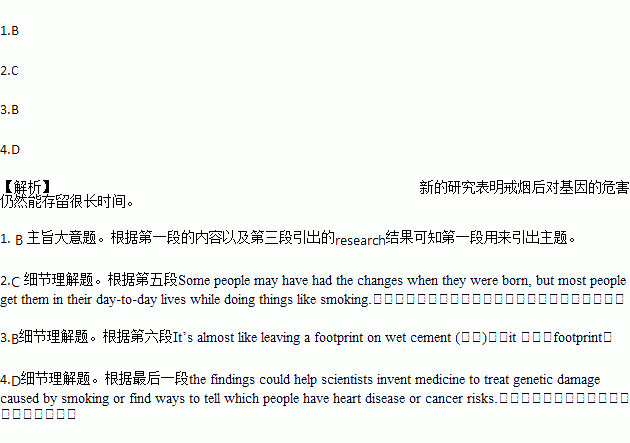题目内容
Smoking is harmful. But as soon as you quit the habit, everything will be OK, right?
Wrong.
New research has found that even if you give up smoking, the damage it has done to your genes (基因) will stay there for a much longer time.
In the research, a team of US scientists studied the blood of 16,000 people. Among them, some were smokers, some used to smoke, and the rest were non-smokers. Scientists compared their genes and found that more than 7,000 genes of smokers had changed-a number that is one-third of known human genes.
According to NBC News, both heart disease and cancer are caused by genetic changes. Some people may have had the changes when they were born, but most people get them in their day-to-day lives while doing things like smoking.
When you stop smoking, a lot of these genes will return to normal within five years.
This means your body is trying to heal (治愈) itself of the harmful effects of smoking. But the changes in some of the genes stay for longer. They can stay for as long as 30 years.It’s almost like leaving a footprint on wet cement (水泥) 一it will always be there, even when you’ve walked away and when the cement becomes dry.
Although the study results may make people unhappy, there is a bright side: the findings could help scientists invent medicine to treat genetic damage caused by smoking or find ways to tell which people have heart disease or cancer risks.
1.The function of Paragraph 1 is to .
A. give an example B. introduce the topic of the passage
C. make an argument D. show the main idea of the passage
2.Most genetic changes happen because of .
A. people’s condition at birth B. environmental pollution
C. people’s bad living habits D. heart disease and cancer
3.The underlined word “it” in Paragraph 6 refers to .
A. the cement B. the footprint
C. the harmful effect D. the genetic change
4.Which of the following statements is true?
A. The findings are the fruit of more than three years’ research.
B. The findings have prevented more people from starting smoking
C. The findings offer evidence that a damaged gene can heal itself.
D. The findings help to find cures for genetic damage caused by smoking.
 导学全程练创优训练系列答案
导学全程练创优训练系列答案
